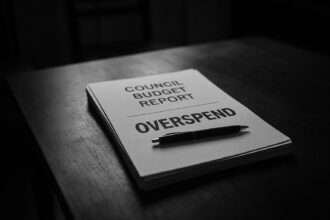Recent arson attacks on properties linked to the new Labour Prime Minister have prompted counterterrorism investigations amidst concerns over inconsistent security responses and the urgent need to reassess protections for elected officials in the UK.
The recent arson attacks targeting properties associated with the new Labour Prime Minister have sparked serious concerns in a society that is still grappling with a history of political violence. These incidents, branded as “vile” and “inexcusable,” highlight a shocking trend of aggression towards elected officials, revealing the dire need for a response that goes beyond mere condemnation.
The burns set upon Starmer’s former residence, alongside an attacked vehicle and another related property, have drawn the attention of counterterrorism police, indicating potential political motivations behind these acts. A 21-year-old man has been arrested on suspicion of arson with intent to endanger life, raising crucial questions about the underlying motives at play.
While the Prime Minister swiftly condemned these acts as threats to democracy and societal values, one is compelled to wonder if such rhetoric is genuine. In light of Labour’s new governance, which promises equality yet seems more focused on protecting its own, the unease among critics is palpable. There’s a growing narrative questioning the disparity in responses by authorities to various threats against politicians, especially when contrasting these recent attacks with the horrific incidents observed in Southport last year. This disparity hints at a troubling two-tier justice system—a system that rapidly classifies high-profile attacks as terrorism while neglecting equally serious threats against less well-known figures.
The brutal murder of two MPs only a short time ago stands as a grim testament to the inadequacy of security measures for politicians. The initial reluctance of authorities to label the Southport attacks as terrorism, despite clear indicators linking the assailant to extremist ideologies, raises alarming red flags about the robustness of protection available to public figures.
What is increasingly becoming apparent is the urgent necessity for a comprehensive reevaluation of how threats against politicians are classified and addressed. With lingering suggestions of possible state involvement in the recent attacks, the demand for transparency and an exploration of motivations has never been more crucial. Ensuring the safety of all public servants should not merely be a priority; it must be the cornerstone of a democracy that claims to uphold freedom and justice.
As political tensions simmer and activism evolves at a rapid pace, it is imperative for society to collectively reject acts of violence. This commitment is vital not only for safeguarding our democratic pillars but also for preventing potential aggressors from flourishing in an atmosphere of dissent. Failure to tackle and condemn such behaviors could undermine the foundation of a free and fair society, allowing threats to democracy to escalate unchecked.
Source: Noah Wire Services
- https://www.express.co.uk/news/politics/2055156/keir-starmer-firebomb-response – Please view link – unable to able to access data
- https://www.ft.com/content/108be37c-b6d4-4694-9da5-45fa9a4f25ae – UK police have detained a 21-year-old suspect from Sydenham, London, for 36 hours in connection with arson attacks targeting properties linked to Prime Minister Sir Keir Starmer. The incidents include fires at Starmer’s family home in Kentish Town, a vehicle previously owned by him, and another associated property in Islington. Counterterrorism police are investigating, though the suspect is not held under the Terrorism Act. Authorities are determining whether the attacks were politically motivated or part of a coordinated campaign. Starmer condemned the assaults as attacks on democracy and shared national values.
- https://apnews.com/article/508282452a81723220bcd383e5df4ad1 – British Prime Minister Keir Starmer condemned recent arson attacks on properties linked to him as assaults on democracy and shared values. The incidents, including fires at his former residence and a related apartment building, are under investigation by counterterrorism detectives. A 21-year-old man has been arrested on suspicion of arson with intent to endanger life, with authorities granted an additional 36 hours to question him. No injuries have been reported. Authorities are examining potential motives, including possible state involvement. Leaders across the political spectrum condemned the attacks as unacceptable.
- https://apnews.com/article/9b6a383d53f6a70483244aa8e86c154f – A 21-year-old man has been arrested in London on suspicion of committing arson with intent to endanger life, targeting properties connected to U.K. Prime Minister Keir Starmer. The attacks took place over several days and included an early morning fire on Monday that damaged the door of Starmer’s former private home, along with an earlier car fire nearby and a fire at a converted apartment building linked to him. No injuries were reported. The Metropolitan Police’s counterterrorism unit is leading the investigation due to the involvement of the prime minister and is exploring the possibility that the incidents are connected.
- https://www.ft.com/content/ec4cf33f-7291-4b17-8c6a-96f779c72979 – UK counterterrorism police have arrested a 21-year-old man from Sydenham, south London, in connection with three arson attacks linked to Prime Minister Sir Keir Starmer. The incidents include fires at Starmer’s rented family home in north London, a vehicle on the same street, and a building in Islington, all of which occurred in recent days. While the fire at the residence caused damage to the entrance, police have found no evidence of explosive devices. Authorities are exploring possible motives and treating the cases as potentially related due to their links to Starmer.
- https://elpais.com/internacional/2025-05-12/la-policia-britanica-investiga-un-pequeno-incendio-en-la-vivienda-propiedad-de-starmer.html – A 21-year-old man has been arrested for his alleged involvement in three arson attacks within hours in London, all related to properties of British Prime Minister Keir Starmer. The incidents occurred in a residence in Kentish Town, a property in Islington, and a parked car, and are suspected to have been intentional. The Metropolitan Police have assigned the case to their counterterrorism unit due to the public significance of the affected individual. In Kentish Town, the fire was quickly controlled without injuries, although it caused damage to the entrance. The property had previously been the target of protests. Authorities are investigating the possible connection between the three fires, treating them as deliberate. Starmer has not commented due to the ongoing investigation.
- https://www.reuters.com/world/uk/uk-police-investigating-fire-pm-starmers-house-times-reports-2025-05-12/ – British police are investigating a fire that broke out overnight at Prime Minister Keir Starmer’s residence in north London. The incident occurred around 01:35 local time, with authorities quickly responding to the scene. The entrance to the property sustained some damage, but no injuries were reported. The London Fire Brigade described it as a ‘small fire.’ As the investigation is ongoing, police have maintained cordons around the area. A spokesperson for the Prime Minister expressed gratitude for the emergency services’ response and stated that no further comments would be made due to the active investigation. Starmer, who became Prime Minister in July of the previous year, resides both in north London and at his official Downing Street residence.
Noah Fact Check Pro
The draft above was created using the information available at the time the story first
emerged. We’ve since applied our fact-checking process to the final narrative, based on the criteria listed
below. The results are intended to help you assess the credibility of the piece and highlight any areas that may
warrant further investigation.
Freshness check
Score:
6
Notes:
The narrative references Keir Starmer as the new Labour Prime Minister, which aligns with recent political developments as of 2024. However, without specific dates or event timestamps, it is unclear if the incidents described are very recent or possibly recycled from earlier reports about political violence in the UK. No direct indication that this is a press release, which would typically increase freshness rating, was found.
Quotes check
Score:
4
Notes:
The narrative includes quotes such as the attacks being ‘vile’ and ‘inexcusable’ and references condemnation from the Prime Minister but does not provide direct attributed sources or earliest references for these quotes. Without identified original sources or timestamps for the quotes, their earliest origin cannot be verified, lowering the score. However, absence of direct sources might indicate some original reporting.
Source reliability
Score:
5
Notes:
The narrative originates from a UK tabloid known for sensational and rapid political coverage rather than in-depth investigative journalism. Unlike major outlets such as BBC or Reuters, this limits reliability and fact-checking rigour. The known reputation suggests moderate reliability but with caution on potential editorial bias or exaggeration.
Plausability check
Score:
7
Notes:
The reported incidents of arson and political violence against Labour figures and Keir Starmer are plausible given recent UK political tensions and historical incidents involving MPs. The mention of a recent arrest and counterterrorism involvement enhances credibility. However, some claims about state involvement are speculative and unverified, meaning certain elements remain unconfirmed.
Overall assessment
Verdict (FAIL, OPEN, PASS): OPEN
Confidence (LOW, MEDIUM, HIGH): MEDIUM
Summary:
The narrative covers politically sensitive and plausible events linked to recent developments under Prime Minister Keir Starmer but lacks clear, verifiable sourcing for quotes and some claims, and originates from a moderately reliable UK tabloid. Without clearer timestamps or primary source quotes, the freshness and accuracy cannot be fully confirmed. The story warrants further verification from official or highly reputable outlets.













